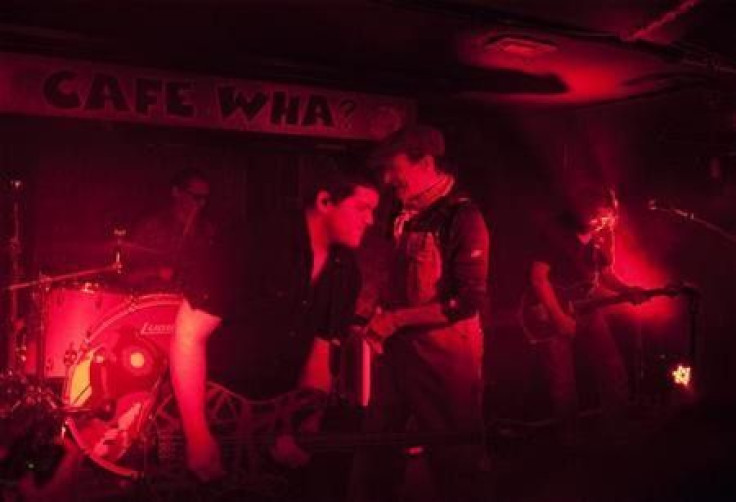Van Halen gets a Jump-start with Roth-fronted album

A Different Kind of Truth is a pretty ponderous name for a not very ponderous album -- Van Halen's first in 28 years with David Lee Roth as frontman. If they'd been in as cheeky a mood titling it as they were in recording it, maybe they could have gone with: 1985.
That's how directly this reunited lineup (give or take a bassist) picks up from where it left off with 1984, Roth's last full studio set with the brothers Van Halen. It really does take place in a different kind of alternate reality where Sammy Hagar, Gary Cherone, and Diamond Dave's Vegas lounge act never happened.
There are a couple of reasons to not find this a fairly joyous listen. One is if you were never a fan to begin with -- fair enough. The other is if you're incorrigibly churlish. Because although it lacks the classic song or three that would lift the album all the way to the level of the vintage canon, Truth finds the fiftysomethings playing and singing like kids, albeit the kids who already sounded impossibly virtuosic and raunchy/wise beyond their years as a teen-prodigy garage band in the mid-'70s.
The opening track, Tattoo -- which met with mixed reactions as the first single -- sounds like an attempt to follow in the lighter footsteps of Jump, the band's biggest and poppiest vintage hit. It's an already underrated song that marries the band's ludicrously funny and barely serious sides, as Roth weaves a series of ink-related anecdotes, from the aging gal trying to spice up her life with some self-illustration (Tramp stamp tat/Mousewife to momshell, in the time it takes to get that new tattoo) to the young patriot who gets his uncle's military unit number branded on his shoulder.
After Tattoo, anyway, the rest of the album passes without the band showing any more mercenary interest in crafting a single, as the tracks mostly lock into a blues-boogie hyperdrive halfway between Black Oak Arkansas and speed-metal -- fancied up, of course, with quick bursts of hooky vocal harmonies and the constant overlay of Roth's stand-up comedy act. Roth continues to be Henny Youngman with a philosophical side and a mean high kick here, with a pretty good ratio of zingers (Love 'em all, I says/Let Cupid sort 'em out; suburban garage-a-trois) to clinkers (My karma ran over my dogma? Really, Dave?).
It may only be after the last three decades of lunkhead metal that once-wary critics can fully appreciate just how guiltless a pleasure it is to hear Dave's streams of consciousness complement Eddie's shredding. As ever, they're the Burns and Allen of rock. Not that straight-woman Grace ever came off as a combination of skilled surgeon and piledriver, the way Eddie Van Halen does when he's piling more notes into a solo than any human before him ever has and still bringing the songs in at (mostly) under four minutes.
In Chinatown, an impossibly fast fantasia about imagined gangland wars and lust in the old town, the guitarist sounds like he might be trying to do some sort of variation on an Asian riff. Or, he might just be going insane -- he's simply playing too fast for us to be able to tell.
We'd like to be able to say that fired bassist Michael Anthony is sorely missed, but, truth be told, newish member Wolfgang Van Halen -- Eddie's son, who joined up for the 2007-8 reunion tour -- does a more-than-fair job of replacing the original bass player's high harmonies as well as low-end responsibilities. Drummer Alex Van Halen hasn't lost a beat, literally, and feet do not fail him when the double bass drums kick in on the good-kind-of-migraine-inducing Bullethead.
Among the singer's more memorable contributions, Roth adds an Ice Cream Man-style acoustic intro to his extended riffs on contemporary religion in Stay Frosty (God is love but get it in writing). He's not above paraphrasing Dylan for a laugh (How many roads must a man walk down before he admits he is lost), but his best set of cultural references comes with You and Your Blues, where Roth rejects lines from almost a dozen different blues standards in the course of complaining about his woman's foul disposition.
Selective amnesia is just a heartbeat away, Roth promises in The Trouble With Never. If you want to do The Vow one better and momentarily wipe the entire MTV era from your memory bank, you really couldn't hope for much better of a brain-cell eliminator than this agreeably time-tripping return to form.
© Copyright Thomson Reuters 2024. All rights reserved.











